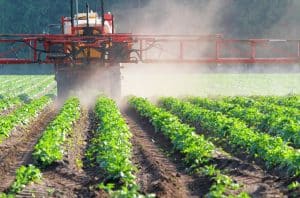What is the Connection Between Pesticides and Cancer?

Carcinogenic Pesticides: Some pesticides have been classified as carcinogens, which means they have the potential to cause cancer in humans. The International Agency for Research on Cancer (IARC), part of the World Health Organization (WHO), evaluates the carcinogenicity of various substances, including pesticides. They categorize substances into different groups, with Group 1 being “carcinogenic to humans.” Several pesticides have been placed in this highest-risk category.
Exposure Pathways: People can be exposed to pesticides through various pathways, including:
Occupational Exposure: Farmworkers, agricultural laborers, and pesticide applicators are at higher risk due to direct contact with pesticides during their work.
Residues of pesticides can remain on fruits, vegetables, and other agricultural products even after washing and can be ingested when these foods are consumed.
Environmental Exposure: Pesticides can drift through the air or leach into water sources, potentially exposing nearby communities.
Home and Garden Use: Household pesticides used for pest control around homes and gardens can also pose a risk if not used properly.
Types of Cancer: Pesticides have been associated with various types of cancer, including:
Non-Hodgkin Lymphoma: Some studies have suggested a link between exposure to certain pesticides, such as glyphosate (found in products like Roundup), and an increased risk of non-Hodgkin lymphoma.
Prostate Cancer: Some pesticides, like organophosphates and certain herbicides, have been linked to an elevated risk of prostate cancer.
Lung Cancer: Pesticide exposure, particularly among agricultural workers, has been associated with an increased risk of lung cancer.
Mechanisms of Carcinogenicity: The exact mechanisms by which pesticides can lead to cancer are complex and can vary depending on the specific pesticide. Some pesticides may damage DNA, disrupt hormone regulation, or promote the growth of cancer cells.
Regulation and Safety Measures: Governments and regulatory agencies in many countries have established guidelines and regulations to mitigate the risks associated with pesticide use. These measures include setting maximum residue limits on food, requiring protective equipment and training for pesticide applicators, and banning or restricting the use of certain highly toxic pesticides.
It’s important to note that not all pesticides are equally carcinogenic, and their safety profiles vary widely. The risk of cancer associated with pesticide exposure depends on factors such as the type of pesticide, the level and duration of exposure, and individual susceptibility. Proper handling, storage, and disposal of pesticides, as well as adherence to safety guidelines, are essential in reducing the risk of exposure and potential harm to human health. If you have concerns about pesticide exposure, it’s advisable to consult with healthcare professionals and follow recommended safety precautions.
